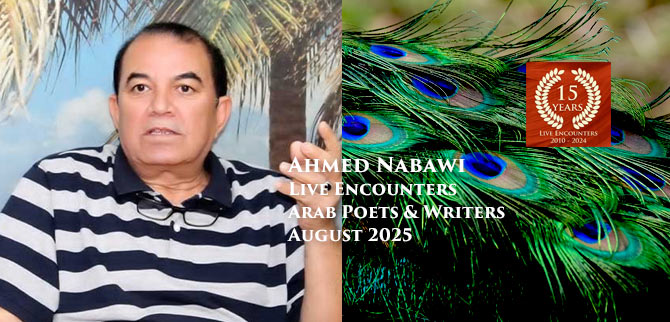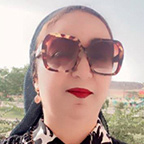
Live Encounters Poetry & Writing August 2025
The Pavement Girl, poems by Ahmed Nabawi.
Translated from Arabic by Dr. Salwa Gouda.
The Pavement Girl
From too much weeping
And her frightful sorrow,
From winter’s bite
On her slender frame,
She slept
On the edge of the pavement.
In her sleep,
She saw
—As they see—
A smile
Lighting her face,
A lovely breeze
Caressing the dimples
In her cheeks,
A noble touch
Gathering her hair,
A kiss
On her bare forehead,
And a mother’s embrace
Holding her,
A tender hug,
And brothers,
And a family,
And a home.
And when passersby stepped on her,
Her eyes opened
To a frightful reality.
She dried her tears,
Gathered her limbs
At the
Very end
Of the pavement.
The Girl-Mother
Like a butterfly at play,
Like a pomegranate flower,
Like the breeze of her village,
Like a pearl of the sea.
In the warmth of her family, she grew,
And in their shelter,
She took her first steps beside a brother
Treading the homeland.
She built him a bridge of tenderness,
And stretched out her laughter to him,
He flowed into her hand,
And walked.
She delighted in his companionship,
Savored his words,
And he shone among the children.
Under a familiar sun,
Amidst the gazes of the fields
And their whispers,
They played together,
Racing all day long.
And as every day,
She gathered her schoolbooks
Into her satchel… in the evening,
After reading the words of dreamers,
And memorizing the lesson on “Peace,”
And memorizing “Good Neighborliness.”
On her soft bed,
She hugged her doll,
And slept,
Like little angels.
But she,
Terrified,
Leapt at the sound of destruction.
Soldiers swarmed like locusts
Upon the tranquility of her people.
They invaded like Tatar hordes,
Spewing hatred through the streets’ mouths,
And fire from house
To house.
So she gathered herself,
Hugged her brother
—Dazed—
And recoiled,
Sought refuge,
—As all did—
In flight.
They marched them toward the camp,
Eyes fixed
Upon their village,
Staring desolately.
And the child,
—From terror—
Babbled in madness,
His eyes searching every face.
He entered the camp,
—Resigned—
Humiliation branded on his pure brow.
And with the mercy of a mother,
That hid in his sister’s instinct,
She leaned over him,
Enveloped him in the curve of her chest,
Heartbroken, weeping,
Trying to draw him into conversation.
And there,
A reporter surprised her:
“How did life pass
Amidst halos of bullets?”
“Life…?
Life is the worst I’ve seen.
No savior,
No salvation.
Nothing remains but fire screaming
And ruin.”
The reporter leaned toward them,
Brushed dust from his eyes.
When poised to ask:
Who remained of her family’s tribe?
She hugged her brother in defeat,
And tears fell
From the depths of her eyes.
The Crippled Elder
When the missile struck him,
He was repeating:
“Your land is your honor,
And freedom
Is the most precious possession.”
When the missile struck him,
The earth drank the elder’s blood,
And the words
Settled in the people.
He was a prisoner of the wheelchair,
For it had accompanied him
—Since he was a boy—
The paralysis of limbs.
But his hand
Was all their hands,
And all legs
Were his leg.
Since he was small,
He found the occupiers at his door.
They stole his land,
His honor,
And raped the dreams of his youth.
Despair did not defeat him,
Nor did hope die in his soul.
He grasped the sword of words.
He kept repeating:
“He who has no homeland in the earth,
Has no grave within it.
Lost is the story,
The dreams,
Our remnants —
The trace of breaths,
A mother’s tears,
A father’s tenderness,
The tree of affection —
Lost are the files of a lifetime.”
He kept repeating:
“He who owns nothing becomes owned.
He who concedes
Becomes worthy of stabs.”
He kept fighting with words.
When the missile struck him,
He was repeating:
“Your land is your honor,
And freedom is the most precious possession.”
When the missile struck him,
The earth drank the elder’s blood,
And the words
Settled in the people.
© Ahmed Nabawi
Ahmed Nabawi is an Egyptian poet and academic renowned for his exploration of humanitarian themes in his poetry. He embarked on his poetic journey in the early 1990s and has since published five collections: Testimony of Love, Wounds Have Tributaries, Flames of Questions, Scenes from the Refugee Camp, The Flourishment of Colors and two forthcoming works titled An Ant Said and The Doors. Beyond his poetry, Nabawi has authored several critical books, including The Poet’s Culture and the Production of Significance, The Poetics of Small Details, The Contemplative Tendency in Andalusian Poetry, and The Heritage Tributaries in Andalusian Poetry.
 Translated by Dr. Salwa Gouda, who is an accomplished Egyptian literary translator, critic, and academic affiliated with the English Language and Literature Department at Ain Shams University. Holding a PhD in English literature and criticism, Dr. Gouda pursued her education at both Ain Shams University and California State University, San Bernardino. She has authored several academic works, including Lectures in English Poetry and Introduction to Modern Literary Criticism, among others. Dr. Gouda also played a significant role in translating The Arab Encyclopedia for Pioneers, a comprehensive project featuring poets, philosophers, historians, and literary figures, conducted under the auspices of UNESCO. Recently, her poetry translations have been featured in a poetry anthology published by Alien Buddha Press in Arizona, USA. Her work has also appeared in numerous international literary magazines, further solidifying her contributions to the field of literary translation and criticism.
Translated by Dr. Salwa Gouda, who is an accomplished Egyptian literary translator, critic, and academic affiliated with the English Language and Literature Department at Ain Shams University. Holding a PhD in English literature and criticism, Dr. Gouda pursued her education at both Ain Shams University and California State University, San Bernardino. She has authored several academic works, including Lectures in English Poetry and Introduction to Modern Literary Criticism, among others. Dr. Gouda also played a significant role in translating The Arab Encyclopedia for Pioneers, a comprehensive project featuring poets, philosophers, historians, and literary figures, conducted under the auspices of UNESCO. Recently, her poetry translations have been featured in a poetry anthology published by Alien Buddha Press in Arizona, USA. Her work has also appeared in numerous international literary magazines, further solidifying her contributions to the field of literary translation and criticism.

